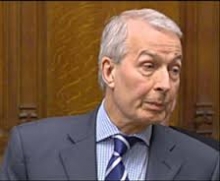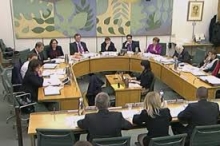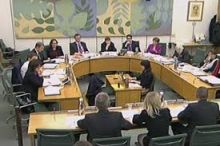Work TV
Watch our TV Channel dedicated to the ‘World of Work’. Explore our video library for informative videos featuring career opportunities at leading companies, franchising opportunities, further education and recruitment professions and their services.
Simon Collyer
DWP Select Committee Comments
Learning Disability Olympia Conference
Learning disability today celebrates its 15th anniversary at Olympia conference centre 26th November 2015.
Learning Disability Today is all about 'Living Well' and will showcase and celebrate initiatives that help improve quality of life for people with learning disabilities, and those who care for and support them.
The show will also address the changing legislation, how it affects the sector, and how you can respond and adapt with positivity. Come along and consider new ways to improve what the industry does; how you live and work with people with learning disabilities.
Innovative projects and organisations that extend choice and control for people with learning disabilities will be showcased throughout the day, on the exhibition floor and within the interactive zones.
Covering examples of good practice and providing practical guidance, the seminars span all aspects of life: health, housing, employment, social life, family and friends.
The inclusive programme will feature representation from across the learning disability community – commissioners, policy makers, charities, providers, family carers, support workers, and most importantly people with learning disabilities.
See more at: http://olympia.london/whatson/learning-disability-today-0#sthash.cpf98fMH.dpuf

Venue:
Olympia Conference Centre
Dates:
26 Nov 2015
Opening Times:
Thu: 9.30am-4.30pm
Event Web:
Organiser:
It is Simon's Birthday - ABC Founder
Today is the birthday of Simon Collyer the founder of the ABC. It is a big birthday (60) (ouch)
A few beers were sunk and more - we thought about the past, but came to the conclusion that the future was what was really worth talking about.
Christopher Johnson, the ABC wingman and bean counter and co-thinker was present. All things considered we live in exciting times we concluded.
As I retire from a great day, I am enjoying the Doors live. Thank you to all those who have made the ABC possible.
Thank you and good night.
Freedom of Information Act under Threat
Plaid Cymru Leader Leanne Wood has called for the Freedom of Information Act to be protected amid fears it could be fatally weakened by the UK Government.
The Assembly Member from the Rhondda said the law had become a valuable tool for shining a light on public bodies throughout the UK and uncovering information that would otherwise be hidden from public view.
Ms Wood has formally submitted a response to the consultation to ‘Independent Commission on Freedom of Information’ which formally closes this Friday (20.11.15).
In her response, she said while it may be in the “interests of some politicians to shut down avenues for scrutiny and hide away information, it was not in the interests of a healthy democracy and a political system people can have faith in to do so.”
Ms Wood’s office has used the legislation to shed light on extortionate pay settlements within the Wales Audit Office and other public bodies, uncovering the number of ex-miners who had died waiting for compensation to be paid by the UK Government and the lack of prosecutions for non-payment of the minimum wage.
Autumn Statement Live - George Osborne 12:30pm Onwards
The Spending Review and Autumn Statement are combined this year. Here's everything you need to know about this fiscal event.
The Spending Review sets out how the government spends taxpayers’ money
The Spending Review is a process that determines how the government will spend public money over the course of the Parliament.
On 25 November the government will publish the results of the Spending Review. This will set out how £4 trillion of taxpayers’ money will be spent on government departments and public services like the NHS and schools.
In the Spending Review the government decides budgets for each department, called departmental settlements
The departmental settlements are the amount the government has allocated to each department to spend over the Parliament. Things that departmental budgets can be spent on include the running of the services that they oversee such as schools or hospital, and the everyday cost of resources such as staff.
Find out more about the Treasury’s role in public spending, and different types of budgets in the how to understand government spending guide.
There is an Autumn Statement every year
The government updates their plans for the economy twice a year at Budget and Autumn Statement. The Autumn Statement usually happens in November or December. The Budget usually happens around March, ahead of the new financial year.
The Spending Review and Autumn Statement are combined this year
In September, the Chancellor wrote to the Office for Budget Responsibility (OBR) asking them to publish a forecast on 25 November and making this a joint Spending Review and Autumn Statement.
There will be one speech, one document and one fiscal event on 25 November 2015.
The OBR was set up in 2010 to provide an independent analysis of the government’s finances and produces forecasts for the next five years twice a year – at Budget and at Autumn Statement.
On the day of the Spending Review and Autumn Statement, the Chancellor will give a speech to the House of Commons.
The Autumn Statement should start around 12:30pm after the Prime Ministers Questions
Live DWP Work & Pensions Committee 09:30am
George Osbourne - Autumn Statement
The ABC will be covering the Autumn Statement live. George Osborne is about to unleash yet more surprises from his Budget bag of tricks as he try's to achieve his small government by stealth, chopping away at the benefits that you and I pay for.
The Chancellors pension reforms were a brave move, but his Tax Credit policies deeply unpopular. Will George start messing around with Housing Benefit? We are looking forward to this event with both fear and trepidation.
Do join the broadcast live from the Houses of Parliament at the ABC website Wednesday 25th, for what could be a very interesting speech from the Chancellor.
Whittakers Almanac - Having Fun With Figures
Whittakers Almanac is the ultimate single-volume referance source packed with thousands of facts, figures overviews and statistices relating to the UK and the world. You might expect to find a copy in your local library.
Given we are all led to belive welfare spending is in such dire need of reform, that if we do not cut it the UK will sink; we were pushed to find straight away, the Work & Pension budget. Can you spot it?
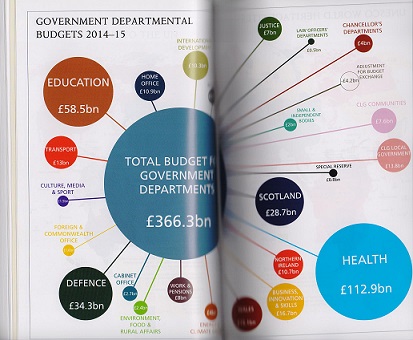
Nurses are doing well according to Whittakers Almanac
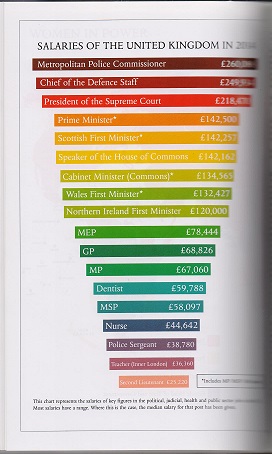
Nurses Pay Scales are attatched - see below.
DWP Committee Looks at Pensions
Irish Politician Joan Burton Living Wage Speech
Irish Politician Joan Burton has just made a very interesting speech on the Living Wage. We have decided to include it in full. It will make interesting reading to those campaigning in the UK on the same topic.
Joan Burton (born 1 February 1949) is an Irish Labour Party politician. In the Government of Ireland, she has served as Tánaiste (deputy prime minister) since 2014 and as Minister for Social Protection since 2011. She is the Leader of the Labour Party since July 2014. She is also a Teachta Dála (TD) for the Dublin West constituency.
***
SPEECH BY JOAN BURTON TD
Tanaiste and Labour Party Leader
Wednesday November 18, 2015
LABOUR IS STANDING UP FOR WORKING PEOPLE – BURTON
Speaking at tonight's Labour Party 'Connolly Cafe' meeting on the Living Wage
Some anniversaries are worth celebrating.
Others merit sober contemplation and reflection.
Five years ago today, the IMF arrived in Ireland, and the troika bailout got under way.
There were more than a few people at the time who described Ireland as being “in mourning”.
I think the terrible events in Paris last weekend – when families lost loved ones to barbarity and savagery - reminded us what it really is for a country to mourn.
Nonetheless, Ireland five years ago was in profound shock.
The country stood on the brink of bankruptcy, and the bailout was the last resort.
Unemployment would soar to 15.1%.
Labour was elected to Government in 2011 with a five-year mandate.
Our first concern was to deal with that economic emergency, unprecedented in our post-independence history.
But Labour brought other concerns to the negotiating table.
We were – and remain – committed to protecting the most vulnerable.
We want a productive and prosperous economy, of course, but one that exists so as to support a modern, fair and inclusive society.
And so we insisted on an agenda that prioritised not just the protection and creation of jobs, but the protection and creation of decent jobs, with decent pay.
Because we are the party that stands up for working people.
Yesterday, the CSO released their latest employment data.
It shows that more than 1,100 people are returning to full-time work every single week.
Unemployment has fallen under 9% for the first time since December 2008.
Behind every new job is a person or family benefitting in their own lives from the wider recovery.
Job creation is central to any recovery strategy.
But that cannot mean jobs at any price.
In the current environment, powerful forces are bearing down on wages at the bottom end of the labour market.
Labour will not allow an economic recovery take hold that creates a growing pool of under-employed, casualised and underpaid workers, with little or no security.
We will not permit profits to be secured on foot of a race to the bottom in employment standards or the sacrifice of hard-won economic and social rights.
We want sustainable, secure and reasonably well-paid jobs for our people.
Because, for our party, paid work is never merely a commodity.
It is about having the wherewithal to plan for a future, for a family, for a mortgage.
Fundamentally, we believe, it is about human dignity and respect.
By the conclusion of this Government, we will have increased the minimum wage from €7.65 per hour to €9.15 per hour – an increase of over €3,000 per year.
Workers now have the legal right to collective bargaining, with real remedies in place to bring employers to the negotiating table.
And we have restored registered employment agreements and established new sectoral employment orders.
We need to ensure that these wage setting mechanisms are fully utilised and we are strongly encouraging employers and trade unions to engage.
We are proud of our record but we need to build on it.
We know that much more remains to be done.
Having a secure and fairly paid job is the single best protection against poverty.
So, our starting point is to deliver full employment by 2018 – meaning a job for everybody who wants one.
In tandem with that, we must ensure our young people are suitably equipped for the workplace of tomorrow.
That means ensuring every young person who wishes to can avail of a third-level place, apprenticeship or traineeship.
In our second term, Labour will create 50,000 new apprenticeships and traineeships across a greatly increased range of professions.
For those already in work, we will establish 100,000 free part-time education places in the areas of highest skill need.
Once people are in work, a core aim must be that no person in full-time employment needs social protection to keep them out of poverty.
The responsibility is on employers in the first instance to pay decent wages.
As Franklin Delano Roosevelt put it back in 1933, in the context of his New Deal:
“No business which depends for existence on paying less than living wages to its workers has any right to continue in this country”.
I’m very pleased to confirm that the Living Wage Campaign will be a central plank in our plans.
One great merit of the campaign is precisely that it is a campaign – a voluntary initiative – rather than a State imposition, based on legislation.
At its heart is an argument, grounded on the social, business and economic case.
A living wage means that a person in full-time work, without additional welfare support, can afford housing, food, utilities, clothing, transport, health care, childcare and some recreation.
It is the rate you pay a worker you want to hold onto.
At Ged Nash’s invitation, employers, trade union representatives and civil society organisations have already met to discuss this initiative and to help carry it forward.
We in the Labour Party have signed up as a Living Wage employer.
And tonight, I am stating my intention that, with Labour returned to Government, we will make sure that the State and all public bodies become Living Wage employers.
This Living Wage commitment will extend not just to direct employees of the State, but also to “outsourced” employees in the security, catering and cleaning sectors.
We will harness the National Minimum Wage to move the wider economy in the same direction.
Labour in Government will task the Low Pay Commission to work, over the next five years, to raising the minimum wage to 60% of the national median.
What will that mean in practice?
There is no official measure of median hourly earnings in Ireland.
However, based on OECD and CSO data, we estimate that the hourly median wage was around €18.84 in the first half of 2015.
In January, the Minimum Wage will increase to €9.15 per hour - about 48.5% of this estimated median wage.
A challenging but achievable target would be to reach 60% of the median wage by 2021 - this would imply a Minimum Wage of €11.30 in 2015 values.
In achieving that, we would in effect be transforming the Minimum Wage into a Living Wage.
Adjustments will be made carefully and incrementally, as economic circumstances allow, to avoid adverse consequences for employment and competitiveness.
Apart from wage levels, there are many other aspects of precarious employment today that need improvement.
As a small and open economy, we recognise such factors as globalisation, the shift from manufacturing to services and the spread of information technology.
We know that these changes have created sectors in the economy that place a premium on flexibility in the workplace.
We welcome business innovations that contribute to economic and jobs growth.
But in all this innovation, the basic requirements of a decent working life must be protected.
We need to strike the right balance between enterprise’s need for flexibility with a worker’s right to job security – to a basic level of predictability in the terms and conditions of work.
We must recognise that this is not solely about employers’ needs.
A lot of workers want that flexibility too, because it suits their personal or family circumstances at a given point in time.
But we also know there are too many people being forced into precarious, badly paid jobs.
And women are over-represented in these jobs.
Our task is to ensure that whole cohorts of our workforce do not fall victim to low pay, or insecure hours, or enforced and bogus self-employment, or similar.
That is why in the Statement of Priorities I negotiated with Taoiseach Enda Kenny, we agreed to commission an independent study on zero hour and low-hour contracts.
That study shows that our laws do not offer adequate protection against abuse.
They do not prevent the spread of so-called “if and when” contracts, under which there is no obligation on the employer to provide regular, scheduled work.
These are frankly perverse arrangements, designed to circumvent our labour laws.
The way parties and politicians react to this specific issue will, I believe, tell a lot about the kind of social and economic model they want to see develop in this country over the next decade and beyond.
Labour’s view is clear: doing nothing on this will not be an option.
We will legislate to prohibit the casualisation of workers and we will ban exploitative zero hour and low-hour contracts.
Everyone who works regular hours for more than 12 weeks will be entitled to a written and enforceable contract that guarantees a basic pattern of work.
Finally, self-employment is an opportunity for genuinely autonomous entrepreneurs to make full use of their capabilities.
We must make room also for small scale “hybrid entrepreneurs”, who combine independent work with a part-time job or a pension; and for stay-at-home parents, who have discovered self-employment as an opportunity to plan their working time around care for small children.
But self-employment can be imposed on the vulnerable, the low paid and those with little social protection.
Labour in Government will root out bogus self-employment.
Where businesses use a self-employment fig-leaf to evade their social insurance and other obligations as employers, then our enforcement agencies must be vigilant to counteract what is in fact downright fraud.
We will also work to amend the Competition Act to allow freelance workers the right to collectively bargain.
That is a flavour of our vision for a second term.
We will stand up for working people – just as we have done in our first term.
We will work to achieve full employment, so that there is a job for every worker who wants one.
To deliver a skills revolution, to equip our young people to get good jobs and build sustainable careers.
And set an agenda that prioritises decency at work and fairness of pay, to ensure all workers can be assured of a good quality of life for themselves, their families and their communities.
So that they share in renewed prosperity, and benefit from the better Ireland we will build.
ENDS

